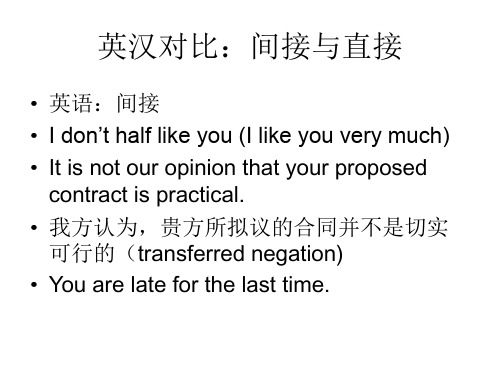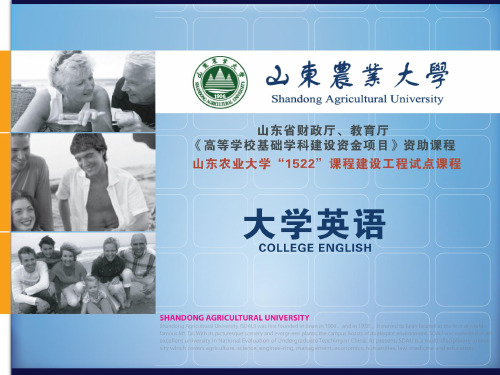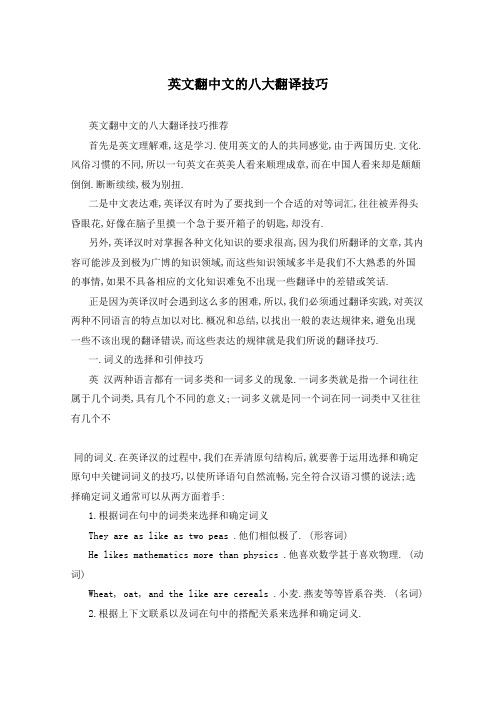英汉翻译(8)正反译法
翻译课正反译法

从以上例子可以看出正反译法是一个很有 用的翻译技巧,虽然说法变了,意思还是原来的。 之所以要改变,主要是由于词语之间的关系、句 式的变化、习惯表达等方面的因素。如不改变, 照字面译,译文就会显得单调、别扭、不自然, 有时还不好懂、不明白。正反译法涉及到词、短 语、甚至整个句子的处理问题,用得恰到好处, 常会“绝处逢生”,有助于获得自然理想的、符 合逻辑习惯的汉语译文,“正话反说,反话正说” 是提高译文水平的有效方法之一。
补充例句
例1.The pursuit of science withdraws interest from external things.
【译文】科学家由于致力于科学研究,对外界 事物总是不感兴趣。
例2:In the grave the rich and the poor lie equal.
【译文】人死后即无贫富之差别。 例3:We live meagerly, but at the same
time, we blessed in many ways. 【译文】我们生活并不富裕,但同时在很多方
面又是很幸运的。
补充例句
例4:My guess is as good as yours. 【译文】我的猜测并不比你的高明。 例5:Before he could stop, I had rushed
汉语的否定词比英语少得多,在表达否定意义 时,汉语没有严格意义上的形态变化,表达形式比 较简单,易于辨认,几乎所有表达否定意义的词语 中都含有明显的标志性否定词,以副词居多,个别 形容词或少数动词,如“不、没、没有、未、无、 非、否、别、莫、勿、毋、休、失、免、缺、禁、 忌、戒、防”等。
由于英汉两种语言的差异和思维方式的不同, 有时英语用否定形式表达的意义,汉语只能用肯定 的形式来表达,否则会使人感到别扭,不地道;英 语用肯定形式表达的意义,汉语只能用否定的形式 来表达,听起来才顺耳,自然得体。改变表达方式 主要从三反面考虑:语言习惯,语言形式,词汇意 义。
翻译讲义正反译法

那家伙很不老实。
7. She refrained from laughing.
她忍住了,没有发笑。
8. All graduates from the Foreign Languages Institutes will not be appointed to do translation work.
▪ 15)At present it is generally accepted, although more as a self-evident statement than on the base of a closely-reasoned scientific proof.
译文:目前,这个观点已被普遍接受,虽然它是不言 而喻的,并不是根据科学严密推理而证明的。
3. spy film 反谍影片
4. After you, sir. 先生,您先请。
▪ 5. 路上辛苦了。 ▪ 原译:You must have had a tiring journey. ▪ 改译:Did you have a good trip? ▪ 6. Keep in lane! ▪ 不准换线! ▪ 7. Keep off the lawn! ▪ 请勿践踏草地!(正说反译)
▪ 译文:他对时间不足感到十分抱歉。 ▪ 20)Behave yourself during my absence. ▪ 译文:我不在时要规矩点。 ▪ 21) This failure was the making of him. ▪ 译文:这次不成功是他成功的基础。
介词
▪ 22)I do think that it is beyond his power to fulfill the task. 译文:我的确认为要完成这项任务是他力所不及的。
week8正反译法

adjective
• • • • • All music is alike to Tom 汤姆对音乐一窍不通. She is superior to flattery. 她丝毫不受奉承的影响 Be foreign to, absent, missing, ignorant, free/exempt from, immune to, far from, safe from, short/devoid of, the last, the least, deaf to, blind to.
• • • •
Sanitary engineer (plumber) Meat technologist (butcher) Law enforcement officer (cop) Member of the oldest profession (prostitute) • Will you be good enough to advise me whether I should accept the invitation? • =please tell me whether …
idiom
• You can go whenever you like, for all l care. • 你愿意什么时候走就什么时候走,与我无 关(我才不管呢) • Catch me making the same error again • 我决不重犯同样的错误。 • As luck would have it(碰巧、不幸), let alone, let…be,
正说反译
• • • • • The first bombs missed the target 第一批炸弹没有击中目标 Such a chance denied me 我没有得到这样一个机会。 He is so mean that he grudges the cost of the polish on his door knocker. • 他太小气,连自家的门环都舍不得让别人 多摸一下。
英文翻中文的八大翻译技巧

英文翻中文的八大翻译技巧英文翻中文的八大翻译技巧推荐首先是英文理解难,这是学习、使用英文的人的共同感觉,由于两国历史、文化、风俗习惯的不同,所以一句英文在英美人看来顺理成章,而在中国人看来却是颠颠倒倒、断断续续,极为别扭。
二是中文表达难,英译汉有时为了要找到一个合适的对等词汇,往往被弄得头昏眼花,好像在脑子里摸一个急于要开箱子的钥匙,却没有。
另外,英译汉时对掌握各种文化知识的要求很高,因为我们所翻译的文章,其内容可能涉及到极为广博的知识领域,而这些知识领域多半是我们不大熟悉的外国的事情,如果不具备相应的文化知识难免不出现一些翻译中的差错或笑话。
正是因为英译汉时会遇到这么多的困难,所以,我们必须通过翻译实践,对英汉两种不同语言的特点加以对比、概况和总结,以找出一般的表达规律来,避免出现一些不该出现的翻译错误,而这些表达的规律就是我们所说的翻译技巧。
一、词义的选择和引伸技巧英汉两种语言都有一词多类和一词多义的现象。
一词多类就是指一个词往往属于几个词类,具有几个不同的意义;一词多义就是同一个词在同一词类中又往往有几个不同的词义。
在英译汉的过程中,我们在弄清原句结构后,就要善于运用选择和确定原句中关键词词义的技巧,以使所译语句自然流畅,完全符合汉语习惯的说法;选择确定词义通常可以从两方面着手:1、根据词在句中的词类来选择和确定词义They are as like as two peas .他们相似极了。
(形容词)He likes mathematics more than physics .他喜欢数学甚于喜欢物理。
(动词)Wheat, oat, and the like are cereals .小麦、燕麦等等皆系谷类。
(名词)2、根据上下文联系以及词在句中的搭配关系来选择和确定词义。
He is the last man to come .他是最后来的。
He is the last person for such a job .他最不配干这个工作。
翻译讲座3:英译汉的技巧

• 6. “What America has lost,” says one veteran observer, “is
第二节 增译法
7. Inflation has now reached unprecedented level. 目前通货膨胀已经发展到空前严重的地步。 (形容词)
8. A fool and his words are soon parted; a man of genius and his money. (并列句中省略的部分)
第三节 减译法
1.Whether the laws are good or bad, they cannot complain, they cannot question, they cannot suggest changes.(作主语的人称代词) 无论法律公正与否,他们无法抱怨、无法质疑、无法建议 修改。 2. He who never reached the Great Wall is not a true man. (表示泛指的人称代词) (物主代词、做宾语的人称代词也可省略)
愚人会很快忘记说过的话,智者会很快放弃手里的钱。 蠢材轻其言,天才轻其财。
第二节 增译法
9. The high-altitude plane was and still is a remarkable bird. (表示时态的词) 该高空飞机过去是,现在仍然是... … 10. A red sun rose slowly from the calm sea. (量词)
第三节 减译法
3. Insufficient power made it difficult to start the motor. (先行代词it) 电力不足,难以使马达启动。 4. Reading furnishes the mind only with materials of knowledge; it is thinking that makes what we read ours. (强调句型中的it) 读书只能给大脑提供知识的材料, 思考才能把我们所读的东西变成自己 的。
英文翻中文的八大翻译技巧

英文翻中文的八大翻译技巧英文翻中文的八大翻译技巧推荐首先是英文理解难,这是学习.使用英文的人的共同感觉,由于两国历史.文化.风俗习惯的不同,所以一句英文在英美人看来顺理成章,而在中国人看来却是颠颠倒倒.断断续续,极为别扭.二是中文表达难,英译汉有时为了要找到一个合适的对等词汇,往往被弄得头昏眼花,好像在脑子里摸一个急于要开箱子的钥匙,却没有.另外,英译汉时对掌握各种文化知识的要求很高,因为我们所翻译的文章,其内容可能涉及到极为广博的知识领域,而这些知识领域多半是我们不大熟悉的外国的事情,如果不具备相应的文化知识难免不出现一些翻译中的差错或笑话.正是因为英译汉时会遇到这么多的困难,所以,我们必须通过翻译实践,对英汉两种不同语言的特点加以对比.概况和总结,以找出一般的表达规律来,避免出现一些不该出现的翻译错误,而这些表达的规律就是我们所说的翻译技巧.一.词义的选择和引伸技巧英汉两种语言都有一词多类和一词多义的现象.一词多类就是指一个词往往属于几个词类,具有几个不同的意义;一词多义就是同一个词在同一词类中又往往有几个不同的词义.在英译汉的过程中,我们在弄清原句结构后,就要善于运用选择和确定原句中关键词词义的技巧,以使所译语句自然流畅,完全符合汉语习惯的说法;选择确定词义通常可以从两方面着手:1.根据词在句中的词类来选择和确定词义They are as like as two peas .他们相似极了. (形容词)He likes mathematics more than physics .他喜欢数学甚于喜欢物理. (动词)Wheat, oat, and the like are cereals .小麦.燕麦等等皆系谷类. (名词) 2.根据上下文联系以及词在句中的搭配关系来选择和确定词义.He is the last man to come .他是最后来的.He is the last person for such a job .他最不配干这个工作.He should be the last man to blame.怎么也不该怪他.This is the last place where I e_pected to meet you .我怎么也没料到会在这个地方见到你.词义引伸是我们英译汉时常用的技巧之一.翻译时,有时会遇到某些词在英语辞典上找不到适当的词义,如果任意硬套或逐词死译,就会使译文生硬晦涩,不能确切表达原意,甚至会造成误解.这时就应根据上下文和逻辑关系,从该词的根本含义出发,进一步加以引伸,引伸时,往往可以从三个方面来加以考虑.1.词义转译.当我们遇到一些无法直译或不宜直译的词或词组时,应根据上下文和逻辑关系,引伸转译.The energy of the sun comes to the earth mainly as light and heat.太阳能主要以光和热的形式传到地球.2.词义具体化.根据汉语的表达习惯,把原文中某些词义较笼统的词引伸为词义较具体的词.The last stage went higher and took the Apollo into orbit round theearth.最后一级火箭升得更高,把〝阿波罗号〞送进围绕地球运行的轨道.3.词义抽象化.根据汉语的表达习惯,把原文中某些词义较具体的词引伸为词义较抽象的词,或把词义较形象的词引伸为词义较一般的词.Every life has its roses and thorns .每个人的生活都有甜有苦.二.词类转译技巧在英译汉过程中,有些句子可以逐词对译,有些句子则由于英汉两种语言的表达方式不同,就不能逐词对译,只能将词类进行转译之后,方可使译文显得通顺.自然;对词类转译技巧的运用须从四个方面加以注意.1.转译成动词.英语中的某些名词.介词.副词,翻译时可转译成汉语中的动词. The lack of any special e_cretory system is e_plained in a similar way.植物没有专门的排泄系统,可用同样的方式加以说明. (名词转译)As he ran out ,he forgot to have his shoes on .他跑出去时,忘记了穿鞋子.2.转译成名词.英语中的某些动词.形容词,翻译时可转换成汉语中的名词.The earth on which we live is shaped a ball.我们居住的地球,形状像一个大球. (动词转译)The tor did his best to cure the sick and the wounded .医生尽了最大的努力来治疗病号和伤员. (形容词转换)3.转译成形容词.英语中有些作表语或宾语的抽象名词,以及某些形容词派生的名词,往往可转译成汉语中的形容词.另外,当英语动词转译成汉语名词时,原来修饰该动词的副词也往往随之转译成汉语中的形容词.It is no use employing radar to detect objects in water.使用雷达探测水下目标是没有用的. (作表语的名词转译)The sun affects tremendously both the mind and body of a man .太阳对人的身体和精神都有极大的影响. (副词转译)4.转译成副词.英语中的某些名词.形容词,翻译时可转译成汉语中的副词.When he catches a glimpse of a potential antagonist, his instinct is to winhim over with charm and humor .只要一发现有可能反对他的人,他就本能地要用他的魅力和风趣将这些人争取过来. (名词转译)三.汉译的增词技巧英译汉时,按意义上.修辞上或句法上的需要加一些词,使译文更加忠实通顺地表达原文的思想内容;但是,增加的并不是无中生有,而是要增加原文中虽无其词却有其意的一些词,这是英译汉中常用的的技巧之一.增词技巧一般分作两种情况.1.根据意义上或修辞上的需要,可增加下列七类词.Flowers bloom all over the yard .朵朵鲜花满院盛开. (增加表示名词复数的词)After the banquets ,the concerts and the table tennis e_hibitor ,he wenthome tiredly .在参加宴会.出席音乐会.观看乒乓球表演之后,他疲倦地回到了家里. (增加动词)He sank down with his face in his hands .他两手蒙着脸,一屁股坐了下去. (增加副词)I had known two great social systems .那是以前,他就经历过两大社会制度. (增加表达时态的词)As for me ,I didn’t agree from the very beginning .我呢,从一开始就不赞成.(增加语气助词)The article summed up the new achievements made in electronic computers,artificial satellites and rockets .本文总结了电子计算机.人造卫星和火箭这三方面的新成就. (增加概括词)2.根据句法上的需要增补一此词汇.Reading makes a full man ;conference a ready man ;writing an e_act man.读书使人充实,讨论使人机智,写作使人准确.(增补原文句子中所省略的动词) All bodies on the earth are known to possess weight.大家都知道地球上的一切物质都肯有重量. (增补被动句中泛指性的词)四.正反.反正汉译技巧正反.反正汉译技巧是指翻译时突破原文的形式,采用变换语气的办法处理词句,把肯定的译成否定的,把否定的译成肯定的.运用这种技巧可以使译文更加合乎汉语规范或修辞要求,且不失原意.这种技巧可分五个方面加以陈述.1.肯定译否定The above facts insist on the following conclusions .上述事实使人们不能不得出以下结论.2.否定译肯定She won’t go away until you promise to help her .她要等你答应帮助以后才肯走.3.双否定译肯定There can be no sunshine without shadow有阳光就有阴影.但是,如果翻译时保留英语原来的〝否定之否定〞的形式并不影响中文的流畅时,则应保留的目的还可突出原文中婉转的语气.如He is not unequalto the duty .他并非不称职.4.正反移位I don’t think he will come .我认为他不会来了.5.译为部分否定Not all minerals come from mines .并非所有矿物都来自矿山.Both of the substances do not dissolve in water.不是两种物质都溶于水.五.汉译的重复技巧重复技巧是英译汉中的一种必不可少的翻译技巧.由于英译汉时往往需要重复原文中的某些词才能使译文表达明确具体;又由于英汉语言结构不同,重复的手段和作用也往往不尽相同,大致可分为三种.1.为了明确I had e_perienced o_ygen and /or engine trouble.我曾碰到过,不是氧气设备了故障,就是引擎出故障,或两者都出故障(重复名词)Under ordinary conditions of pressure ,water becomes ice at C and steamat100C.在常压下,水在摄氏零度时变成冰,在摄氏一百度时变成蒸汽. (重复动词)A locality has its own over-all interest ,a nation has another and theearth get another.一个地方有一个地方的全局,一个国家有一个国家的全局,一个地球有一个地球的全局(重复谓语部分)2.为了强调He wandered along the street ,thinking and thinking brooding andbrooding.他在街头游来荡去,想了又想,盘算了又盘算.3.为了生动While stars and nebulae look like specks or small patches of light . theyare really enormous bodies.星星和星云看起来只是斑点点,或者是小片的光,但它们确实是巨大的天体.六.倒译技巧英汉词句组成和排列的顺序千差万别,因此英译汉时作些调整,颠倒一下顺序,则是一种极为常见的翻译技巧,这种翻译技巧共分五种类型.1.复合句倒译技巧.复合句倒译可分为部分倒译和完全倒译两种技巧.This university 6 newly _established faculties ,namely .Electronic Computer,High Energy Physics ,Laser ,Geo-physics ,Remote Sensing, and GeneticEngineering.这所大学现在有电子计算机.高能物理.激光.地球.物理.遥感技术.遗传工程等六个新建的专业. (部分倒译)Many laws of nature actually e_ist in nature though they have not yet beendiscovered.虽然许多自然规律还没被发现,但是它们确实在自然界中存在. (完全倒译)2.被动句倒译的技巧.被动句倒译时,有时可将被动句倒译成主动句,有时可将状语倒译成主语.The structure of an atom can be accurately described though we cannot seeit.虽然我们看不见原子结构,但能准确地描述它. (被动句倒译成主动句)Table tennis is played all over China .中国到处都打乒乓球. (状语倒译成主语)3.以否定型副词或条件副词开头的句子的部分倒译技巧.能引起这种倒译的副词有no ,never ,hardly ,no longer . in noway ,not until ,not even ,only等.Never before have I read such an interesting book .我从来没有读过这样有趣的书.4.带有介词短语句子的部分倒译技巧These date will be of some value in our research work .这些资料对于我们的研究工作有些价值.5.习语的倒译技巧.习语的倒译可分为按照汉语的固定顺序倒译和从轻重上加以区分进行倒译以及逆时间顺序进行倒译三种技巧.For its last 600 miles the Yellow River flows eastwards through the flat ,fertile ,North China Plain ,which is densely populated.黄河最后的六百英里,向东流过平坦肥沃.人口密集的华北平原. (按照汉语的固定顺序倒译)Heal the wounded ,rescue the dying ,practice revolutionaryhumanitarianism.救死扶伤,实行革命的人道主义. (以轻重上区分进行倒译)We have to be quick of eye and deft of hand .我们必须眼疾手快. (逆时间顺序倒译)七.句子成份的转译技巧英汉两种语言,由于表达方式不尽相同,在具体英译汉时,有时往往需要转换一下句子成分,才能使译达到逻辑正确.通顺流畅.重点突出等目的.句子成分转译作为翻译的一种技巧,其内容和形式都比较丰富,运用范围也相当广泛,共包括五个方面的内容.1.主语转译技巧,可以将句子的主语转译成汉语中的定语.宾语.状语等.The wings are responsible for keeping the sir plane in the air.机翼的用途是使飞机在空中保持不坠. (转译成定语)To get all the stages off the ground ,a first big push is needed.为了使火箭各级全部离开地面,需要有一个巨大的第一次推力. (转译成宾语) Machinery has made the products of manufactories very much cheaper thanformerly.因为机械的缘故,工厂里出的产品比起以前来,价格便宜多了. (转译成状语)2.谓语转译技巧.可以将谓语转译成定语.Radar works in very much the same way as the flashlight.雷达的工作原理和手电筒极为相同.3.宾语转译技巧.可以将宾语转译成主语.Automatic lathes perform basically similar functions but apper in avaritety of forms.各种自动车床的作用基本相同,但形式不同4.定语转译技巧.定语可以转译成谓语和状语.Neutron has a mass slightly larger than that of proton.中子的质量略大于质子的质量. (转译成谓语)Scientists in that county are now supplied with necessarybooks ,epuipmentand assistant ,that will ensure success in their scientific research.现在已给该县科学家提供了必要的图书.仪器和助手,以保证科研工作的成功. (转译成状语)5.状语转译技巧.状语转译一般指的是状语从句的转译.它可分作把时间状语从句转译成条件状语从句,把地点状语从转译成条件状语从句和把原因状语从句转译成困果偏正复句中的主语等三种形式.These three colors ,red ,green ,and violet ,when combined ,produced white.红色.绿色和紫色这三种颜色如果合在一起就变成白色. (时间状语从句转译成条件状语从句)Where there is nothing in the path of beam of light ,nothing is seen.如果光束通道上没有东西,就什么也看不到. (地点状语从句转译成条件状语从句)Because he was convinced of the accuracy of this fact, he stuck to hisopinion.他深信这件事正确可靠,因此坚持已见. (原因状语从句转译成因果偏正复合句中的主句)八.分句.合句汉译技巧英译汉时,由于两种语言的句子结构大不相同而往往需要改变一下句子结构以适应于汉语的表达习惯.采用分句.合句进行翻译的作法正是为了达到这种目的而运用的一种重要技巧.所谓分句,就是指把原文的一个简单句译成两个或两个以上的句子;所谓合名,就是指把原文的两个或两个以上的简单句或一个复合句译成一个单句.运用这种分句.合句的汉译技巧可以使译文层次分明,更合乎于汉语的表达习惯.分句流译的技巧共分五种类型,合句汉译的技巧共分三种类型.先谈谈分句汉译技巧的五种类型.1.主语分句汉译技巧.A man spending twelve days on the moon would find ,on returning to theearth ,that a year had passed by already.一个人如果在月亮上度过了十二天,回到地球以后就会发现一年已经过去了.2.谓语分句汉译技巧.It goes without saying that o_ygen is the most active element in theatmosphere.不言而喻,氧气是大气中最活泼的元素.3.定语分句汉译技巧He managed to raise a crop of 200 miracle tomatoes that weighed up to twopounds each.他居然种出了二百个奇迹般的西红柿,每个重达两磅.4.状语分句汉译技巧Sunrays filtered in wherever they could ,driving out darkness and chokingthe shadows.阳光射入了它所能透过的地方,赶走了黑暗,驱散了幽影.5.同位语分句汉译技巧.Mary normally a timid girl ,argued heated with them about it.玛丽平常是个腼腆的姑娘,现在也热烈地和他们辩论起来._年翻译资格考试三级口译模拟题1. The average age of people in the countryside is increasing, while thatof the cities is falling. More old people stay in the countryside than youngpeople and the opposite is true in the cities.译文:农村人口的平均年龄正处于上升趋势,而在城市却正好相反.原因是在农村老年人要比年轻人多,城市正好相反.解析:本句难度适中,只需要按照句子的逻辑顺序将句子信息陈列出来即可.此外,本句无明显生词.2. One important reason for the move to cities has to do with quality oflife issues: comfort and convenience. For e_ample, most of us would like ourchildren to receive the better education, and cities often offer betterschools.译文:〝进城热〞与生活水平问题息息相关.人们向往城市舒适方便的生活.就像我们大部分人都想子女能够接收到更好的教育,而城市通常就有教育质量更好的学校.解析:在做本句翻译时需要注意在前半句适当地增译一些信息,如在comfort and convenience 处需要加上move to thecities的主语〝人们〞.后半句难度不大,直译即可.3. Most burglars are opportunist, looking for an easier break-in. So don’tmake things simply for them. Don’t advertise the fact that you are out or away,or be careless about security.译文:大部分的窃贼都是投机分子,他们会寻找最方便快捷的〝翻.墙入室〞的机会.所以不要给他们可乘之机.不要嚷嚷着让别人都知道你不在家,也不要太精选大意而忽略了安全问题.解析:本句句型不复杂,需要注意几个词语的译法,如opportunist本来是〝机会主义者〞,在这里用于形容burglars身上,需要相应地翻译成贬义词〝投机分子〞;此外,don’tmake things simply for them可以用成语〝可乘之机〞概括,这些需要同学平时多做翻译练习积累,在会在临考时马上反应出来.4. Researchers from the University of Copenhagen and the University ofIceland said ash particles from the early part of the volcanic eruption areespecially abrasive, posing a possible threat to aircraft engines.译文:来自哥本哈根大学和冰岛大学的研究者们表示早些时候火山爆发遗留的火山灰摩擦度非常高.这可能对飞机的引擎产生威胁.解析:本句句型简单,但生词较多,需要考生抓注意些重点词汇理解.如:volcanic eruption 是表示〝火山爆发〞, abrasive表示〝磨损的〞.考生在遇到不会的单词时也不用过于慌张,一般句子中包含大量专业词汇句意都比较简单,可凭上下文进行推测.5. Lack of sanitation leads to wide spread of contamination of drinkingwater. Recent statistics say water-associated infectious diseases claim up to3.2million lives each year, appro_imately 6 percent all death globally.译文:不注意环境卫生会导致饮用水大规模受污染.近期的数据显示与饮用水有关的可传染性疾病每年可导致320万人失去生命,这个数字接近每年全球死亡人数的6%.解析:本句的主题是高口中常考的环境问题,全句无复杂结构,考生需要保证数字听译的准确性.本句中有出现两处数字,要求考生掌握数字速记的方法.contamination :污染infectious :传染的,有传染性的appro_imately :大约_年翻译资格考试三级口译模拟题The term 〝American dream〞 is widely used today. But what e_actly does thisconcept mean? Where does the term come from? Has the meaning of the term changedover time? Questions like these can complicate a seemingly simple term and leadus to an even more important question: is the American dream a myth or a realitytoday?The term 〝American dream〞 began to be widely used in _67. The term wasused in a famous novel written by Horatio Alger. The novel, Ragged Dick, was a〝rags to riches〞 story about a little boy who was orphaned and lived in NewYork. The boy saved all his pennies, worked very hard, and eventually becamerich. The novel sent the message to the American public that anyone couldsucceed in America if they were honest, worked hard, and showed determination tosucceed. No matter what your background, no matter where you were from, nomatter if you had no money or no family, hard work and perseverance would alwayslead to success.Today, the message from Alger’s novel is still a prevalent one in thiscountry. It is still used to define the American dream. A very basic definitionof the American dream is that it is the hope of the American people to have abetter quality of life and a higher standard of living than their parents. Thiscan mean that each generation hopes for better jobs, or more financial security,or ownership of land or a home.However, new versions and variations of the American dream have surfacedsince Alger’s novel was published. For one thing, the basic definitionI stateda moment ago —the idea that Americans are always seeking to improve theirlifestyle — also suggests that each generation wants more than the previousgeneration had. Some people would argue that this ever-increasing desire toimprove the quality of one’s life may have started out on a smaller scale in thepast, but today has led to an out-of-control consumerism and materialism. Another more benign view of the American dream is that it is about thedesire to create opportunities for ourselves, usually through hard work.Ahallmark of the American dream, some would argue, is the classic〝self-starter,〞the person who starts out with very little in life—little money, few friends,few opportunities—and works hard to make his or her way in the world. A classice_ample of this type of American dreamer would be former president AbrahamLincoln, who was born in a log cabin, was largely self-educated, and yet workedhis way up in the world to eventually become a United States president. This view of the American dream has also been associated with immigrantsand their quests for a better life in a new country. Americans have long beenfascinated by immigrant stories, and many feel great pride about their ownfamilies who may have come from other countries, worked very hard, and created abetter life for future generations.The American dream has also, historically, been associated with westwarde_pansion in this country. Throughout most of the _00s, the notion of thefrontier—a vast e_panse of largely unclaimed land in the West—symbolized newopportunities and a fresh start to people. Many a dreamer set off for the Westin search of land, jobs, gold, or other opportunities, often with ne_t tonothing in his pocket. Unfortunately, this idea of new opportunities in the Westhad a negative side.The American West was not unpopulated; Native American Indians already lived there, along with other immigrant groups, and these people were oftendisplaced — or met with violence — if they interfered with the visions or ideasof westward-migrating Americans.A more recent interpretation of the American dream has to do with equality.Civil rights activists such as Dr. Martin Luther King Junior, used some of therhetoric associated with the American dream to urge people to work for equalopportunities for all Americans, not just some Americans. A harsh reality wasbecoming clear to some people, especially in the _60s and _70s: not everyone had the same opportunities. If people were denied jobs, education, or otheropportunities because of their race, ethnic background, or gender, was the American dream only a myth?英语翻译。
7正反、反正译法

【译文】凡是活在世上的人都曾有过神仙般 的几段绝好时光。(双重否定表示强烈肯定)
12
例5:The significance of these incidents wasn’t lost on us.
【译文】这些事引起了我们的重视。
例6:He has no small chance of success.
【译文】她忍住没有笑。
例5:The thick carpet killed the sound of my footsteps. 【译文】我走在厚厚的地毯上一点儿声 音也没有。
18
例6:The pursuit of science withdraws interest from external things. 【译文】科学家由于致力于科学研究, 对外界事物总是不感兴趣。 例7: My guess is as good as yours. 【译文】我的猜测并不比你的高明。
14
课堂互动1: 翻译句子, 注意否定译肯定
1.Students, with no exception, are to hand in their papers this afternoon. 【译文】今天下午,学生统统要交上书面作业。 2.Styles come and go, but good taste is timeless. 【译文】文风随时在变,而文雅是永恒的。 3.All the articles are untouchable in the museum. 【译文】博物馆内一切展品禁止触摸。 4. No one has nothing to offer to society. 【译文】人人对社会都有所贡献。(双重否定用 来表示强烈肯定)
Unit8 正反译法讲解

英语的否定形式是一个常见而复杂的问 题,使用非常灵活、微妙。
词汇:英语中表否定的词比汉语多,有 名词、代词、动词、形容词、副词、 介词、连词等;
意义:全部否定、部分否定、半否定、 双重否定;
表达方式:有单词或词组,有特殊结构, 有习惯用法。
-有的英语句子形式上是肯定的而实质上 是否定的,有的形式上是否定的而实 质上是肯定的;
1)He is not a fool. He is no fool.
• 他不是傻瓜。 他一点也不傻。
•
(他很精明)
2)It is not an easy task.
这不是件容易的事。
It is no easy task.
• 这可不是轻而易举的事。
3) It is not a joke. It is no joke.
• 1) I don’t think he would come.
• 我想他不会来。 • 2) I don’t suppose it’s true.
• 我想这不是真的。 • 3) I don’t believe anyone will object
to my opinion.
• 我相信没有人会反对我的意见。
A)One can scarcely pay too high a price for liberty.
人们为自由付出的代价再高也不过分。
to be bought.
• 这种用三种语言编写的教材到处都买
不到。
3. 部分否定
• 部分否定主要由all, every, both, always等含
全体意义的词与否定词构成,这类否定句中的否 定词not有时与谓语在一起,构成谓语否定。形 式上很像全部否定,但实际上是部分否定。在这 种部分否定句中,因词序与汉语很不相同,汉译 时稍一不慎就会造成差错,这类句子中不论 not 在什么地方,通常都译为“不全是”、“不总 是”、“并非都”、“未必都”等。
- 1、下载文档前请自行甄别文档内容的完整性,平台不提供额外的编辑、内容补充、找答案等附加服务。
- 2、"仅部分预览"的文档,不可在线预览部分如存在完整性等问题,可反馈申请退款(可完整预览的文档不适用该条件!)。
- 3、如文档侵犯您的权益,请联系客服反馈,我们会尽快为您处理(人工客服工作时间:9:00-18:30)。
• Affirmative-negative transformation of connectives • 1) It is before ten yet. • 还不到十点钟。 • 2) Don't come in unless I call you. • 要是我不来叫你,你别来。 • 3) He took two steps and heard, rather than saw, a strange whirring sound coming toward him. • 他走了两步就听见,而不是看见,一个奇怪的呼 啸声冲他而来。 • 4) You cannot succeed unless you work hard. • 你不努力是不会成功的。
• 按照专家们的说法,不用说打仗,就连出海也是 不容许的。
• 4) He tried to catch one of the rafts with a boat hook but missed. • 他努力想用船钩钩住一只竹筏,可是没钩着。 • 5) Your legs are young enough to hold you. • 你的腿还没老得走不动呢。 • 6) These are days when nerves are worn thin. • 这些日子教人吃不消。 • 7) "You'll go in and say good-bye to Miss Pinkerton, Becky!" • "I suppose I must," said Miss Sharp calmly, and much to the wonder of Miss Jemima;... • “贝吉,你要进去跟娉克敦小姐道声别。” • “我想这是免不了的。”夏普小姐不动声色地说,而吉米 小姐直觉诧异。
• • • • • • • • •
Affirmative-negative transformation of adjectives 1) Pure metals have few useful properties. 纯金属几乎没什么可取的特性。 2) Hence her flight from her own family would be laid more to the door of a lovely temperamental peevishness than anything else. 因此,她从自己的家里出走,与其推委于别的原因,倒不 如归咎于那种无伤大雅的暴躁脾气。 3) With regard to the appearance of the Sixth Fleet off the Syrian coast it seems that this was simply an innocent preparation for maneuvers planned long ago. 至于叙利亚沿海出现第六舰队一事,似乎也只是很早就计 划好了的军事演习的准备工作而已,毫无恶意可言。 4) A desert is a barren tract of land. 沙漠为不毛之地。
Lecture Nine
•Negation Negation • (正说反译和反说正译) 正说反译和反说正译)
• • • • • • • • • •
1) I fail to understand your meaning. 我没有理解你的意思。 2) We tried vainly to measure the voltage. 我们设法想测出电压,但没测成。 3) Free from anxiety, the old are living a happy life in the home-for-the-aged. 老人们无忧无虑,在敬老院里过着幸福的生活。 4) But that's very extraordinary. It seems against nature. 可是,这极不平常,似乎与自然规律不符。 5) Any use of the atomic bomb on Manchurian targets would be more for purpose of panic than of destruction. 任何使用原子弹对准满洲里的这些目标,其目的与其说是 摧毁,倒不如说是恐吓。
• Affirmative-negative transformation of nouns • 1) They look after the interests of their own to the exclusion of those of all others. • 他们只是照顾到自己的利益,却不照顾所有其他 人的利益。 • 2) Silence reigned all over for a while. • 一会儿,全场鸦雀无声。 • 3) Her abstraction was not because of tea party. • 她心不在焉并非是因为茶会。
• Affirmative-negative transformation of adverbs • 1) He needed Jack too much to risk making him angry. • 他太需要杰克的帮助,不好冒犯他 。 • 2) They resumed their seats moodily. • 他们不愉快地又坐了下来。 • 3) Slowly he pulled the letter out of the envelope, and unfolded it. • 他不慌不忙地将信从信封中抽出来打开。 • 4) He can read fairly easily. • 他阅读没什么困难。源自• • • • • • •
Classroom Practice (1) Affirmative-negative transformation of verbs 1) He denied his crime. 他不承认自己有罪。 2) He kept his eyes off Gesse's feet. 他故意不看杰西的脚。 3) According to "experts", you are not allowed to be out at sea at such circumstances, let alone fight.
• Affirmative-negative transformation of phrases and sentences • 1) Make yourself at home. • 别客气。 • 2) The news of the assasination of President Lincoln spread like wildfire. • 林肯总统被暗杀的消息不径而走。 • 3) The pioneers made light of difficulties and dangers. • 开拓者们轻视困难和种种危险。 • 4) Miss Fairlie kept to her room all day. • 法拉力整天足不出户。 • 5) Haste makes waste. • 欲速则不达。 • 6) Hawkins smiles like a man able to take care of himself. • 霍金斯笑起来的样子倒不象是个不会照顾自己的人。 • 7) I want everybody to have a fair deal. • 我要人人都不要欺诈。
2. A negative statement in English is put into an affirmative one in Chinese
• 1) He was not sorry to get rid of his cold. • 他伤风好了感到很高兴。 • 2) "I don't know if I ought to have come, " she said breathlessly, grasping Phyl's arm. • “我不知到该不该来,”她气喘吁吁地说,一把抓住非尔 的胳膊。 • 3) These words are undeserved. • 这些话过奖了。 • 4) Misunderstanding leads to mistranslation. • 误解导致误译。 • 5) His spies were not going to lose sight of me. • 他的密探一直在监视我的行踪。
• Classroom Practice (2) • Negative-affirmative translation of verbs • 1) "I don't know. I didn't notice it until my feet felt hot." Chairman Mao replied. • “不知到啊!我感到脚烫时才发现。”毛主席说。 • 2) We can't be too careful. • 我们越仔细越好。 • 3) She didn't half cry. • 她大声吵闹。 • 4) I couldn't feel better. • 我觉得精神好极了。
• • • • • • •
Negative-affirmative translation of adverbs 1) He is not seldom ill. 他常生病。 2) An opportunity is not likely to repeat itself. 良机难再。 Negative-affirmative translation of adjectives 1) They were, not, however, left long undisturbed. • 然而他们并没有得到多久的安宁。 • 2) The television pictures were so clear and sharp showing the deep shadows and bright sunlight, that they seemed almost unreal. • 电视画面那么清晰和鲜明,显示出阴暗的黑影和 明亮的阳光,看上去真有些疑真疑幻。
